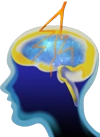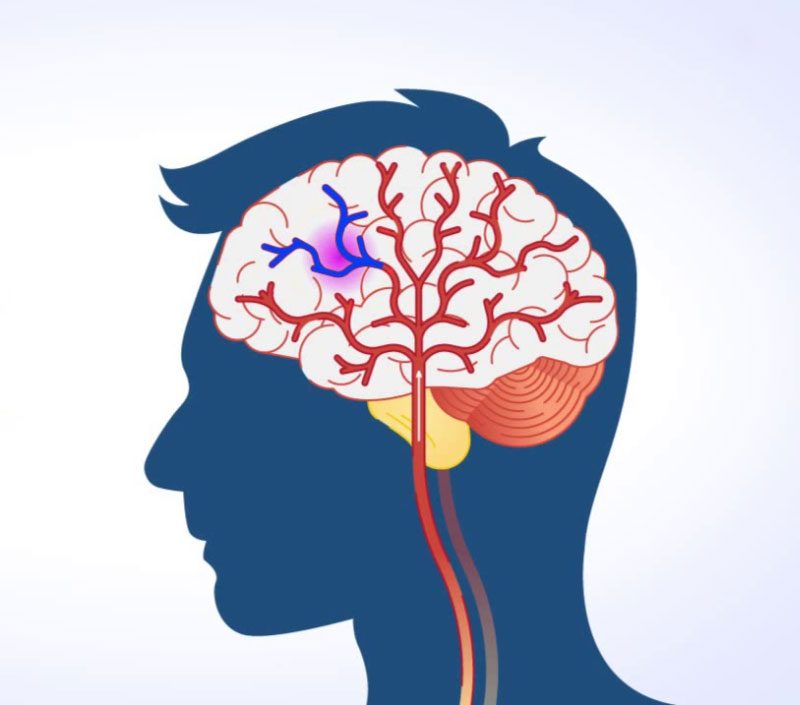Stroke
Stroke
Stroke is a disorder caused by a sudden and severe lack of oxygenated blood to the brain, which causes brain cells to die rapidly. As a result, quick medical attention is required to avoid additional harm, which may be irreparable. Stroke is one of the top causes of death and disability in India, with a frequency of 119 to 145 cases per 100,000 people. If you suffer from Stroke and need immediate treatment Call our expert Dr. Amit Shah on 9819561456.
What are the types of Stroke?
Stroke is categorized into three types. They are as follows:
- Ischemic Stroke
- Haemorrhagic stroke
- Transient ischemic attack (TIA)
- Aneurysm
- Subdural Hematoma (SDH)
- Arteriovenous Malformation (AVM)
What are the symptoms of Stroke?
Symptoms that might indicate a stroke- Difficulty keeping balance due to lack of coordination
- visible vision difficulties in one or both eyes.
- facial paralysis or numbness that causes the face to seem uneven.
- numbness or paralysis in the upper limbs.
- slurred speech or the incapacity to talk at all.
What are the Causes of Strokes?
Ischemic stroke is caused by a significant constriction or blockage of the blood arteries in the brain, preventing blood from flowing to the brain. The brain cells die as a result of a lack of oxygenated blood. Plaque, or undesirable fatty deposits that form in blood arteries over time, is one of the leading reasons of this obstruction. Some research has shown that COVID-19 infection might possibly be a cause of Ischemic stroke. Studies and research are continuously being conducted to confirm this. Haemorrhagic stroke is caused by the rupturing of blood arteries in the brain, which may occur as a consequence of any of the following:- High blood pressure
- Excessive dependence on blood thinners
- An accident resulted in severe trauma.
- Protein deposits cause vessel wall thinning.
What are the Factors that enhance the chances of having a stroke?
- Excessive or excessive drinking
- Blood pressure is too high
- Smoking excessively
- Underlying issues such as high cholesterol, diabetes, and obstructive sleep apnea
- Stroke
- Obesity or excessive body weight
- Lifestyle stagnation
- Infection with COVID-19
How to Diagnose Stroke?
- Physical examination to determine the effect of the stroke on your neurological system.
- Blood tests are used to analyse blood clots and to detect your blood sugar levels.
- CT scan of the brain to get comprehensive pictures of the brain in order to diagnose an ischemic stroke, tumour, or bleeding in the brain
- MRI scan to assess the amount of brain tissue damage caused by an ischemic stroke or brain haemorrhage.
- Carotid ultrasonography is used to look for plaque in the arteries in the neck.
- Cerebral angiograms are used to examine the arteries in the brain and neck in great detail.
- An echocardiogram is a test that employs sound waves to provide detailed pictures of the heart. It aids in determining the origin of a clot that is causing the obstruction.
Treatments
Ischemia Stroke
- Emergency intravenous medication is used to dissolve or break up clots and restore blood flow. In certain situations, it may help the patient recover completely.
- Emergency endovascular methods provide more focused therapies, including clot removal using a stent retriever and catheter-based medicines.
- Carotid endarterectomy is a procedure that removes plaque from the carotid artery, which is one of the arteries in the neck.
- Angioplasty involves stent implantation to treat and maintain constricted arteries open.
Haemorrhagic Stroke
IV medicine and blood transfusions are examples of emergency services. The main emphasis is on reducing or stopping the leakage by reducing or stopping the flow of blood. This might be accomplished by employing particular medications to reduce the strain on the brain.
Surgical intervention to reduce brain pressure and restore damaged blood arteries. Surgery may also be indicated to repair aneurysms, arteriovenous malformations (AVM), and other blood vessel abnormalities caused by the stroke.
For more information & consultation on Stroke treatment, Call our expert Dr. Amit Shah – Consultant Neurologist in Mumbai on 98195 61456 or Book an Appointment

